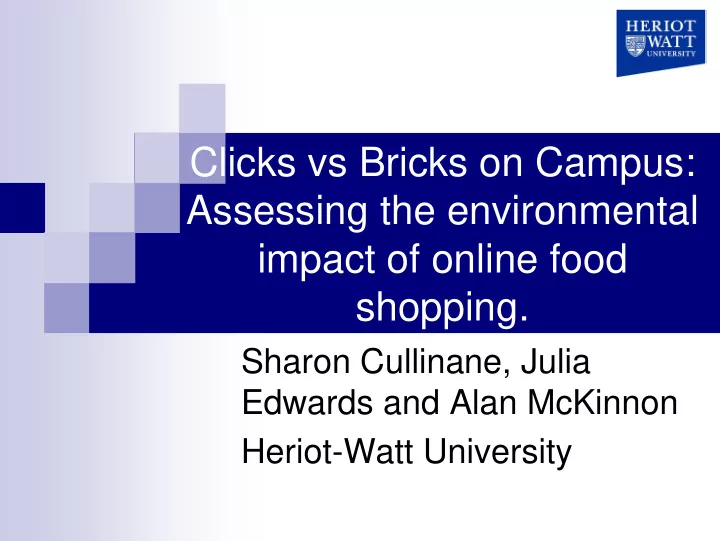

Clicks vs Bricks on Campus: Assessing the environmental impact of online food shopping. Sharon Cullinane, Julia Edwards and Alan McKinnon Heriot-Watt University
UK E-retail spend (£bn) 50 45 40 35 30 £bn 25 20 15 10 5 0 1990 1995 1996 1997 1998 1999 2000 2001 2002 2003 2004 2005 2006 2007
Travel for shopping • In GB, on average, each person makes 219 shopping trips per year (vs 160 for commuting) • This accounts for 21% of total trips made • Each person travels 926 miles per year to shop. • 82% of this distance is done in a car • Contributes approx 264kg CO 2 per person per year
Impacts of online shopping on travel (passenger) � First order effects: - Reduced car use (but trip chaining) – substitute � Second order effects: - Releases car for other trips (by shopper or other member of household) - Make longer shopping trips - Still visit shops for social reasons Substitute or complement
Views of large supermarkets Ocado (responsible for deliveries for Waitrose supermarket): “each Ocado delivery van replaces 40 car journeys every day” Tesco : “each delivery van replaces 6000 car journeys per year”
Impacts of online shopping on travel (freight) More deliveries to home. Effects depend on: � Vehicle type � Drop density � Geographical coverage � Returns � “not at homes” � Load consolidation Plus � Sourcing from further afield � Greater use of air transport � Construction of new e-fulfilment centres
Research Question � Does online grocery shopping reduce total vehicles miles travelled? � Do the shopping habits of students give us any insights? � Pilot study for large-scale survey of population
Methodology • Self-completion questionnaire survey of Heriot-Watt University students in April 2008. • Heriot-Watt University located on outskirts of Edinburgh, approx 3 miles from nearest supermarket • 358 questionnaires completed
Table 1. Reasons why respondents food-shop online Average score Reason (max=4) It saves me having to carry things 3.38 It gives me more time to do other things 3.31 I only buy what I need rather than buying luxuries 2.72 I can choose the shop I want to buy from 2.65 There is a better choice of goods online 2.45 Products are cheaper online 2.36 I don’t like shopping 2.15 It is better for the environment 2.13 I have a physical difficulty getting to the shops 1.82 It saves me having to park 1.67 N.B Average scores are calculated from a Likert type question.
Determinants of online shopping Whether respondents shop online is significantly related to: � Residential location (respondents living on campus are significantly more likely to shop online) � Access to a car (those without access to a car are significantly more likely to shop online) � Age (those age 26+ more likely) � Nationality (Asians more likely)
Table 2. Attitudes to online food-shopping issues by online shoppers Agree Neutral Disagree Not applicable I think it is better for the 18 (32) 24 (43) 9 (16) 5 (9) environment than going to the shops It has encouraged me to 28 (49) 14 (25) 14 (24) 1(2) buy other things online It has reduced the need for 17 (30) 10 (18) 14 (25) 16(28) me to have a car N.B Figures in brackets are row percents.
Travel change as a result of online shopping: � 67% of online shoppers previously walked or cycled to shop � 37% said they still visit the shops as much or more frequently than before they shopped online � Students group together to shop online (good for the environment)
Conclusions � Overall reduction in mileage is small � Obviously sample not representative of population. Results suggest some ideas to follow up in wider survey of population.
Recommend
More recommend